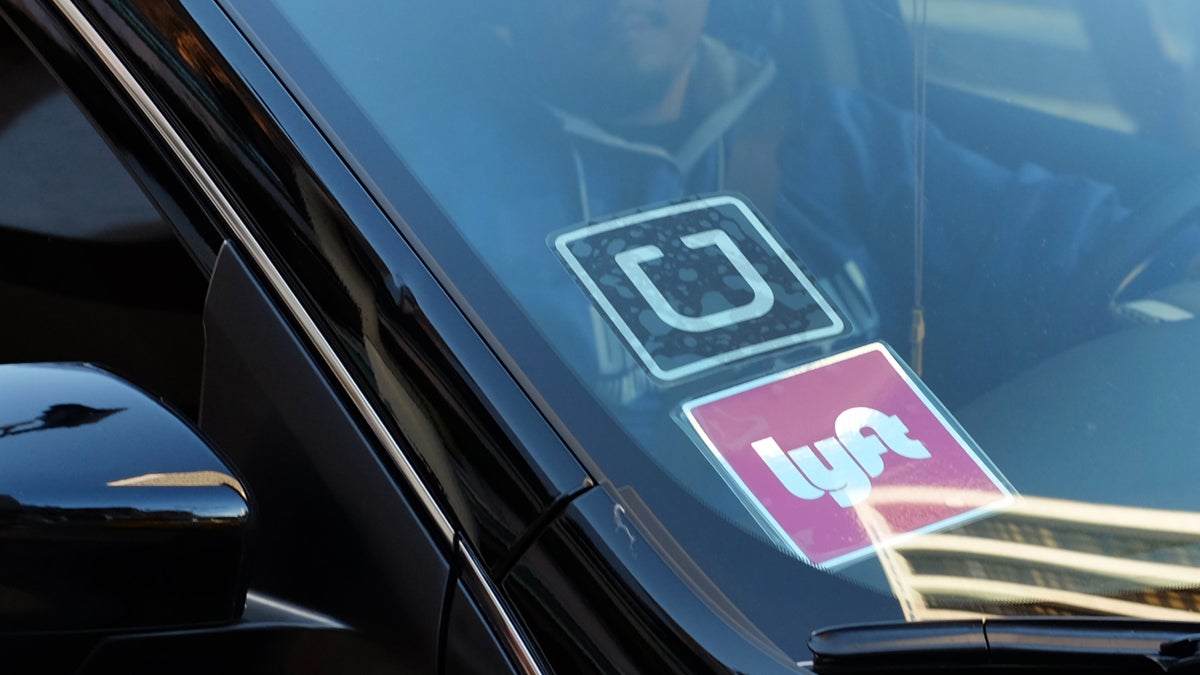Trump era capitalism: Brands take a stand

A driver displaying Lyft and Uber stickers on his front windshield is shown dropping off a customer in downtown Los Angeles. (AP Photo/Richard Vogel
My local coffee shop recently announced that 5 percent of all coffee purchases over a three-day period would be donated to the ACLU. So said the sign posted at the front counter.
Call it a sign of the times.
Have you noticed lately that everything seems to be getting politicized? Yeesh. The age of Trump is tough enough to navigate without having to keep track of which companies and products are in the right or wedded to wrong.
But alas, this is what happens in a seriously polarized society. Politically charged capitalism is becoming the new norm. Heck, a few weeks ago, many of us felt compelled to decide whether to dump Uber and go with Lyft, based on which company seemed to be more right than wrong about Trump’s Muslim-targeted travel ban.
According to the website ethicalconsumer.org, this new politicized capitalism is “turning the market into a site for politics and ethics, as consumer choices reflect personal attitudes, and purchases are informed by ethical or political assessment of business practice.” Businesses increasingly feel pushed to take stances. Consumers increasingly shop not just for good products, but for the stances that reflect their values.
This is not a totally new phenomenon (some pro-choice pizza lovers have long shunned Domino’s because its owner is an anti-abortion activist; ditto, Chick-fil-A), but Trump’s ascent has stoked this sentiment to fever pitch. Everyone is choosing sides, even at the cash register (or at the iPad that functions as a cash register). Take my local coffee shop, for instance. It’s part of a small chain which clearly calculated that donating to the ACLU — translation: opposition to Trump — would be good for business, but I have to assume that prospective customers in Trump’s thrall were turned off.
It’s like that everywhere. Starbucks vows to hire 10,000 refugees worldwide — another whack at Trump — and a “Boycott Starbucks” campaign has trended on Twitter. A software company, Palantir, was reportedly weighing the possibility of aiding the Trump regime’s immigrant enforcement efforts — until protesters showed up and threatened a campaign to thwart Palantir’s hiring efforts. A watchdog website, grabyourwallet.org, lists the companies that carry Trump-related products, in the hopes of deterring consumers and punishing the companies.
The irony of this week’s Nordstrom episode — as you know, the chain has dropped Ivanka’s product line, prompting Papa Bear to whine how it’s “very unfair” — is that Nordstrom was not taking a political stance. It was simply acting in accordance with the traditional capitalistic precepts of supply and demand. The company said that sales of Ivanka items had declined steadily over the past year, “to the point where it didn’t make good business sense for us to continue with the line for now.”
But Nordstrom’s explanation didn’t matter. Propaganda minister Sean Spicer decreed yesterday that Nordstrom “attacked” Ivanka simply because it didn’t like her dad’s policies. As corporate consultant Allen Adamson told the Associated Press, “The environment is full of companies taking political stands. So in this environment, [Nordstrom’s decision] will be perceived as a political statement. Nordstrom is getting dragged into this even though they may not want to be.”
For businesses, the perils of this environment are obvious. It may seem desirable — in some cases, even necessary — to take a political stand, but there’s clearly a risk in potentially alienating half of one’s potential clientele.
Some CEOs don’t have to worry — Netflix boss Reed Hastings called Trump’s travel ban “un-American,” knowing full well that few Trumpkins would dump the streaming service; ditto Starbucks — but a recent Harvard Business School study warns: “In order to reap the benefits and mitigate the risks, companies have to better understand the attitudes of internal and external stakeholders when it comes to controversial issues [and] clarify how they relate to the company’s values and business.”
Values and business… The Uber-Lyft rivalry, which played out in the early hours of Trump’s travel ban, was classic. As a faithful Uber user, I struggled to keep tabs on who held the moral high ground. I won’t detail all the dueling gestures, but this was the gist:
Lyft, which competes with Uber for riders, released a statement opposing the travel ban (“we stand firmly against these actions”). Around that same time, someone on Twitter pointed out that Uber co-founder Travis Kalanick served on Trump’s 18-member economic advisory council. Also around that time, Uber announced that, at JFK Airport, it was suspending its surge-pricing mechanism (which raises fares during peak-demand periods), in order to help protesters get to and from the airport more easily. But because the JFK cab drivers had briefly staged a strike to protest the ban, some tweeters claimed that Uber, by suspending surge prices, were trying to steal the cabbies’ customers. As one tweeter told Uber, “Eat [excrement] and die.”
Still with me?
Anyway, Uber was speedily tagged as politically bad. A hashtag campaign, #deleteuber, sprang up seemingly within minutes, and meanwhile, Lyft announced that it was donating money to the ACLU. Uber fought back, declaring that the travel ban was “unjust,” and that it would devote $3 million to a new Uber fund assisting its immigrant drivers. And last week, Kalanick resigned from Trump’s advisory council.
Phew! OK, so I’m keeping my Uber app. Life in politicized Trumplandia sure is exhausting.
—
Follow me on Twitter, @dickpolman1, and on Facebook.
WHYY is your source for fact-based, in-depth journalism and information. As a nonprofit organization, we rely on financial support from readers like you. Please give today.
